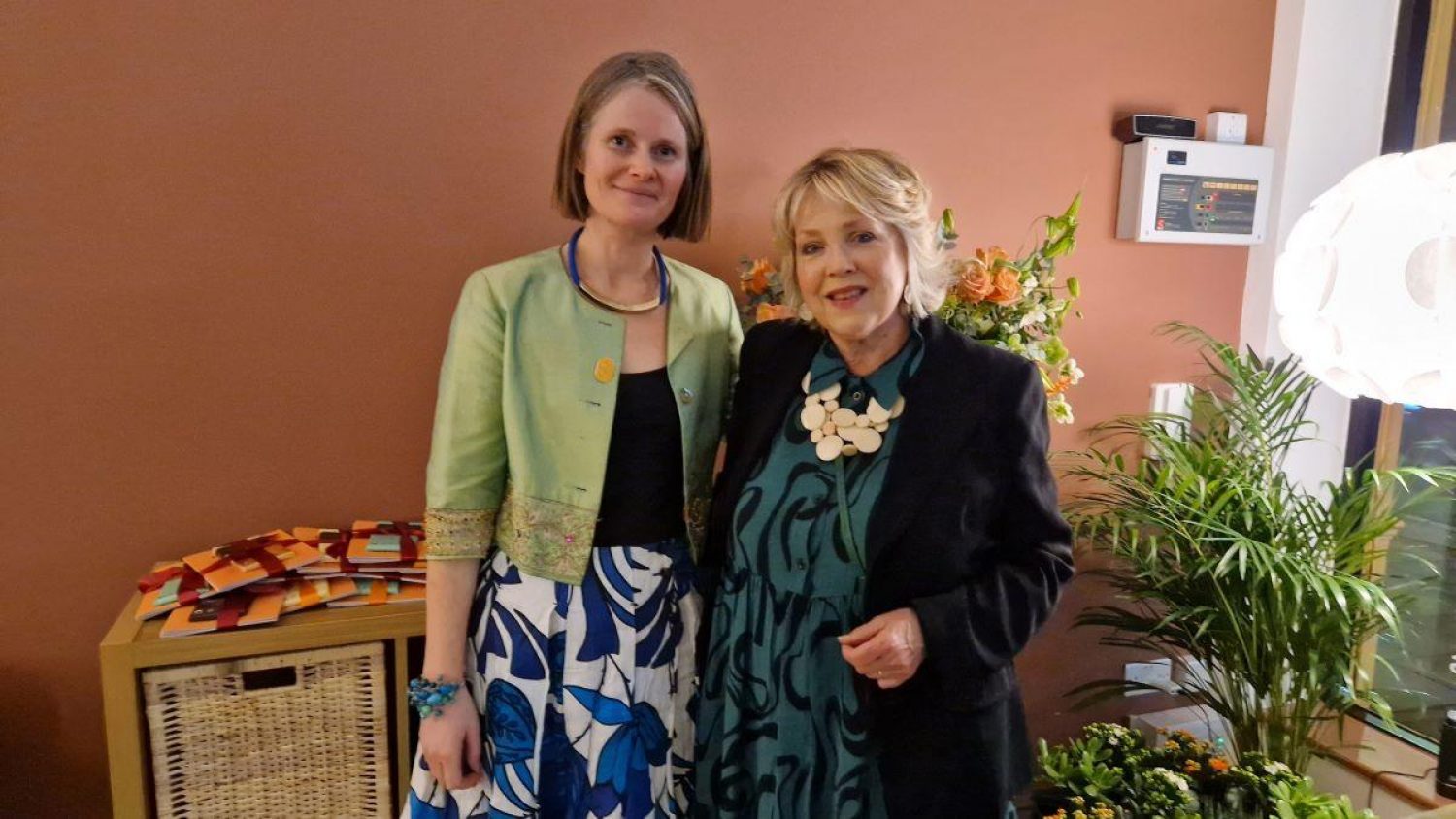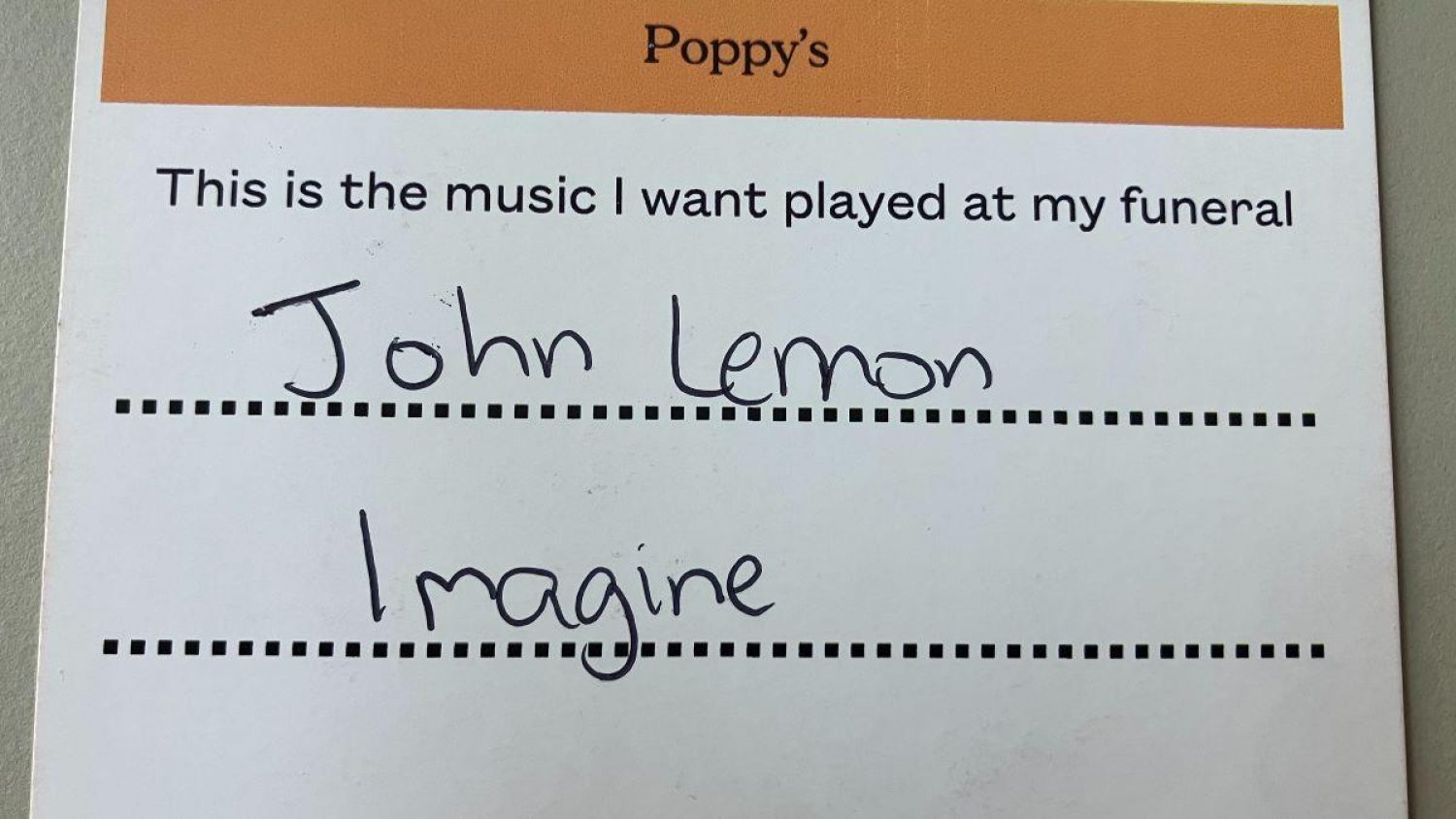Six minute read
Jo Fairley (pictured above right), founder of Green and Black’s chocolate, joined us as we launched Poppy’s Sheen in January 2024. Jo and our founder Poppy Mardall talked about the power of business for good and what makes a meaningful funeral. Here’s a flavour of their conversation.
What do you think makes a good funeral?
Jo:
I feel, like most of us, that I’ve been to too many funerals! Some have been awful but there have been a few really amazing ones.
My husband and I were at another really anonymous funeral, where the vicar could barely get the person’s name right. I said to him, 'we’re not going to do it like this'.
A few months later we bought a piece of woodland close to where we live. When my father-in-law died, he’d already picked a tree to be buried under, a not-very-native olive tree, next to an oak tree in a clearing.
My five-year-old grandson was involved in digging his grave. We rang bells at his funeral and it felt like we saw his spirit soar. It was extraordinary.
I’ve lost a lot of really close friends at ridiculously young ages, and being part of some of their funerals was a way of coming to terms with what had happened.
Poppy:
The privilege and the challenge of doing this for a job is that you’re also burying people that you love and caring for their bodies.
What defines a positive experience for me is that the people involved get what they want and need. This is different in every circumstance. I hate the idea of funerals being ‘traditional’ or ‘alternative’. Whether or not, say, you have a black hearse, is a very superficial thing!
I think what makes it good is having people around you who are listening to what you want and need. That’s specific to you — we shouldn’t make assumptions about what that would look like.
I remember this amazing man who came into Poppy’s — livid to be organising a funeral for his estranged dad. Delivering for him was getting him in and out in 15 minutes and we did.
And then I remember another wonderful family. We brought the person who died home and carried him into their living room. The family wanted to take the lid off the coffin, and when I did, the three-year-old grandchild was like, 'hi grandpa'. The funeral was colourful, it was gorgeous.
I have no issue with traditional funeral directors, there are some excellent traditional funeral directors, but I do have an issue with the industrial line process that treats the dead person like an object, and the living family like customers to be processed as well.
Jo:
I think it’s about knowing that person, who they were and what they liked, and what would be meaningful to them. That’s why talking about it before it happens can be so important.
You can know what somebody’s last wishes were, what music they’d like and you don’t have to second guess or relay your idea of what a funeral should be like on this occasion.
I’ve been to really good funerals which have been ‘stage managed’ by the people who have died. Then it’s an extension of them, not the standard readings and the standard hymns. I don’t understand why that makes things easier, but it does, it makes it more personal. My experience is that you are left with a more positive memory.
Poppy:
We launched a service last year called My Funeral Wishes, it’s a 45-minute free consultation, where you can come on your own or you can come in a group, digitally, you can do it on site.
It’s not selling you a funeral plan. It’s about having a meaningful conversation where you say what matters to you or what you don’t want happening to you, like, 'I don’t want loads of money spent' or 'I don’t want to be embalmed'.
We shouldn’t wait until people are in crisis in order to start talking about these things.
What motivated you to start your own businesses?
Jo:
I’m a serial entrepreneur now. I’ve started several businesses, and they’ve all been selfishly based in not being able to find something that I want in the marketplace and setting out to fill the gap. I always think this is a really good standpoint for starting a business.
Until then I’d been a journalist which meant that I had my finger in the wind. I knew what the trends were and what people were interested in.
I never really planned to become an entrepreneur, but I found a sample bar of chocolate on my husband’s desk, took two bites out of it and it was the best chocolate I’ve ever eaten. Eventually after much nagging from me, he turned round and said, 'well, why don’t you do it?'.
Poppy:
The word ‘entrepreneur’ doesn’t sit so naturally with me, because I don’t think that I would turn my hand to anything,
I’m really motivated by a sense of injustice. People are at an inherently vulnerable time in their life when organising a funeral and they don’t necessarily have people advocating on their behalf.
People tell me things like, 'I had a funeral six years ago and it’s only now that I’m realising I feel ripped off' or 'I really wanted this thing and they said I couldn’t have it but is that right?'. That makes me livid.
If I ever need to build courage, which being a founder you often have to do, I remember the people telling me about when it’s not been good enough. This experience in life isn’t happening well enough for most people right now.
Jo:
And it’s all happening out of sight, yet it’s something that’s going to happen to every single one of us! We’re all going to be bereaved, we’re all going to lose people, yet we only address that when it’s an emergency.
What do you need to bear in mind when growing a business?
Poppy:
Right now, we look after about 400 families a year. It still feels like we’re this best kept secret. The vast majority of people walk into the first funeral directors they find on the high street, take the information they are given as fact, and maybe only later they think it could have been better.
What motivates me to bring Poppy’s to more places serving more people is that, if we get big enough, will also put pressure on the others to raise their game.
We want great care to be the norm, not the exception. That’s why we’re here and that’s why we want you to come in and have conversations with us and your friends, family and neighbours.
Clare, our CEO, and I talk about this a lot — growth but not at all costs. We want to serve many more people and we are very ambitious about that, but there would be no point in expanding our service just to be like everyone else.
Jo:
Small businesses can make a small difference, but big businesses can make a big difference.
I want to see one of these on every high street, I genuinely do. I want to see people popping in for a cup of tea or coffee or whatever. To me it’s so logical, why doesn’t it already exist? I hope this is the first of hundreds of Poppy’s.
Why should we talk more about death?
Poppy:
I used to have a very socially acceptable job at Sotheby’s auction house. When I told my mum I was going to become a funeral director, she thought I was going to put a hat on and embalm people. We need to totally reimagine what a funeral director is. It’s social conscience that drives our work.
Read more about why Poppy became a funeral director.
We are trying to create an open door, to say if you’re dreading this conversation, it might not be what you think it is. There is an idea that people don’t want to talk about death, but I think people are longing to talk about death…
Jo:
…But they don’t have a safe space to do it.
For me, thinking about death makes life more precious. It makes you appreciate it more. If you never think about it, I think you could sleepwalk through life.
To stay in touch with all the latest news and updates from Poppy's by email, sign up here or contact us if you need help planning a funeral.


